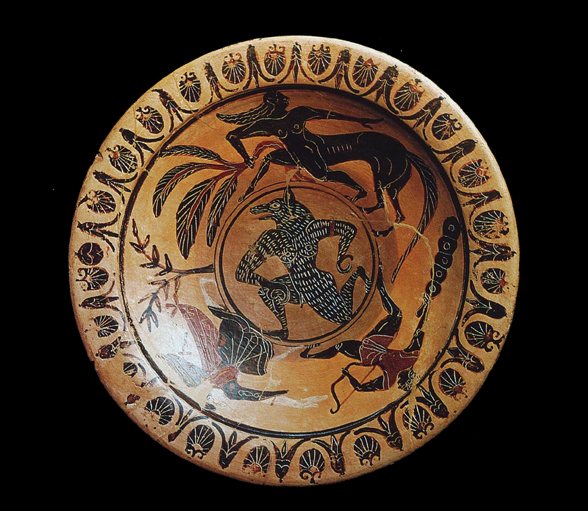Figure above:
Painting on a plate of Etruscan manufacture, from Vulci, dating to the
VI century B.C., now in the Museo di Villa Giulia, Rome. At the centre
is shown a “wolf-man”, around which can be recognized Heracles,
with his club and bow, Deianeira and the Centaur Nessus.
The wolf was associated, in the ancient Greek world, with the particular
mental condition produced by the intervention of a character, known
as Lyssa, “wolfish rage”. In Homer, this term is employed
with reference to two main warriors, pertaining to opposite sides: Ector
and Achilles. It signifies the impetuous power during the battle, which
renders the warrior particularly courageous and fearful. This fury and
fierceness were both associated with the wolf behavior. Euripides put
this demon on the scene of his tragedy dedicated to Heracles, where
he acts precipitating the hero into a folly which led him to kill his
own children. Falling in prey of Lyssa meant thus to be turned temporarily
into a wild being, to be dominated by a destructive force, typical of
the warrior (Comba 1992, p. 235-236).
[Source: http://library.artstor.org/library/]
Figure below:
View of the Mount Lykaion, in Arcadia, with the remains of an altar
dedicated to Zeus Lykaios. In this sanctuary, initiation rituals were
performed, of which some indications can be detected in various sources.
It seems that, during the ritual, human flesh was served mixed with
that of other animals: those who should have tasted this food were believed
to turn into were-wolves (lykánthropoi). Abandoned their
clothes, they swam across a pond and lived for nine years among the
mountains, in the shape of wolves. The tenth year the initiates crossed
again the pond and became men again. They could then rely on a new and
mysterious strength, permitting them to win in the athletic competitions,
such as the prestigious Olympic games. It was narrated, indeed, of a
certain Demenetos from Parrhasia, in South Arcadia, who was winner in
the boxing competitions at Olympia, that he had, during the rituals
in honor of Zeus Lykaios, eaten the viscera of a child and had been
transformed into a wolf (Pliny, Natural History, VIII, 82).
[Source: http://lykaionexcavation.org/about/excavating-at-the-birthplace-of-zeus]


